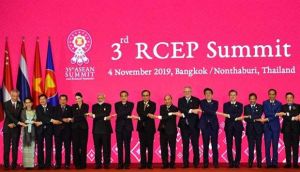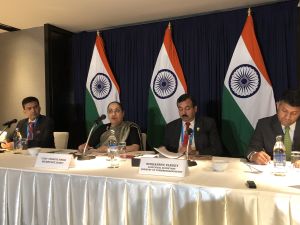
BANGKOK: In a major development with enormous implications for India’s regional standing, Prime Minister Narendra Modi has conveyed at the RCEP summit in Bangkok that India will not join the proposed world’s largest trading area as it is not in the country’s national interest.
The overarching message from PM Modi was clear that although India started negotiations on RCEP in good faith, it can’t join as its core interests on a set of interlinked issues such as commensurate reciprocity on services were not addressed.
“India conveyed its decision at the summit not to join the RCEP agreement. This reflects both our assessment on the current global situation as well as fairness and balance of the agreement. India had significant issues of core interests that remained unresolved,” Secretary (East) in the Ministry of External Affairs Vijay Thakur Singh told reporters in the Thai capital.

Mrs Singh said PM Modi highlighted at the RCEP summit that he was guided by the impact the deal would have on the lives and livelihoods of all Indians, especially the vulnerable sections of the society. Asked if there was a possibility of India joining the RCEP at a later stage, she only reiterated that India has decided not to be part of it.
Government sources said that India decided not to join Regional Comprehensive Economic Partnership (RCEP) agreement as the RCEP agreement does not reflect its original intent and the outcome envisaged in the agreement was not fair or balanced.
Sources said that India’s key concerns such as inadequate protection against import surge, insufficient differential with China, possible circumvention of rules of origin and no credible assurances on market access and non-tariff barriers were not adequately addressed by the other 15 nations.
In his speech at the RCEP summit in Bangkok on November 4, PM Modi said that India stands for greater regional integration as well as for freer trade and adherence to a rule-based international order. “India has been pro-actively, constructively and meaningfully engaged in the RCEP negotiations since inception. India has worked for the cherished objective of striking balance, in the spirit of give and take.”
“Today, when we look around we see during seven years of RCEP negotiations, many things, including the global economic and trade scenarios have changed. We cannot overlook these changes. The present form of the RCEP Agreement does not fully reflect the basic spirt and the agreed guiding principles of RCEP. It also does not address satisfactorily India’s outstanding issues and concerns In such a situation, it is not possible for India to join RCEP Agreement,” PM Modi added.
PM Modi’s statement indicated that the Indian delegation, which included Commerce Minister Piyush Goyal, had come to Bangkok in a positive frame of mind with a view to conveying a principled and qualified assent to the deal, but the lack of reciprocity on India’s key demands proved to be a deal-breaker.
Author Profile

- Manish Chand is Founder and Editor-in-Chief of India Writes Network (www.indiawrites.org) and India and World, a pioneering magazine focused on international affairs. He is CEO, Centre for Global India Insights, an India-based think tank focused on global affairs.
Latest entries
 India and the WorldFebruary 17, 2026South-by-South: Focus on people-centric solutions at India AI summit
India and the WorldFebruary 17, 2026South-by-South: Focus on people-centric solutions at India AI summit India and the WorldFebruary 7, 2026Modi hails interim India-US trade deal, Goyal says no concessions made on agriculture
India and the WorldFebruary 7, 2026Modi hails interim India-US trade deal, Goyal says no concessions made on agriculture India and the WorldFebruary 2, 2026Trump announces trade deal with India, Modi ‘delighted’
India and the WorldFebruary 2, 2026Trump announces trade deal with India, Modi ‘delighted’ India and the WorldJanuary 31, 2026Palestinian minister bats for mediatory role for India in ending Gaza conflict
India and the WorldJanuary 31, 2026Palestinian minister bats for mediatory role for India in ending Gaza conflict







